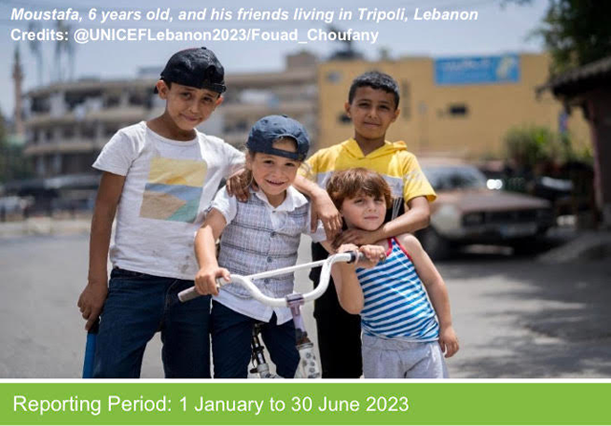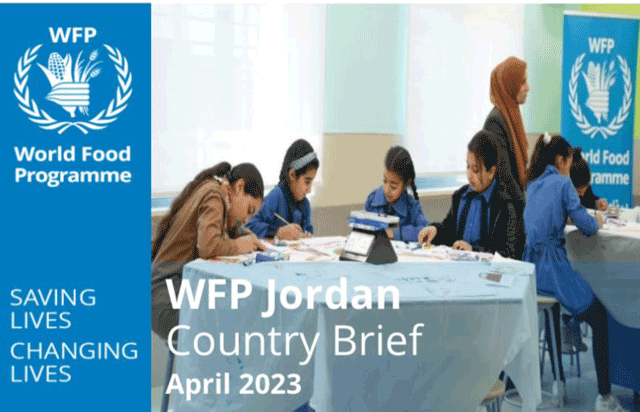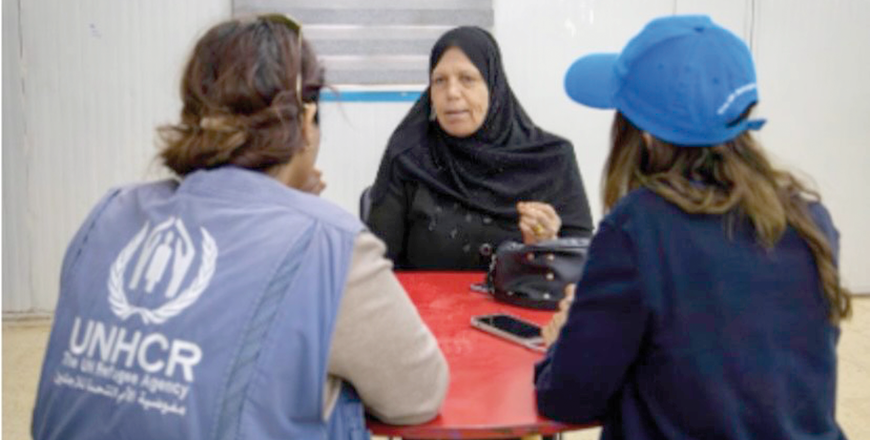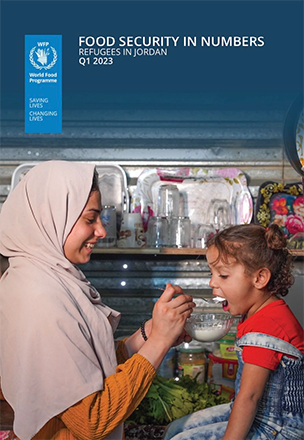You are here
UNICEF Jordan faces $92.5 million in funding gap to continue vital services for vulnerable children
By Mays Ibrahim Mustafa - Oct 10,2023 - Last updated at Oct 10,2023

The cover of the report
AMMAN — UNICEF Jordan is currently dealing with a 57 per cent funding gap equal to $92.5 million, according to a recent report.
The report revealed that the UN agency appealed for $161.35 million in 2023 in order to continue to provide its services for vulnerable children and their families in Jordan.
However, UNICEF Jordan had only managed to secure $31.8 million in contributions by the end of the second quarter (Q2) of 2023. With a “carry forward sum” of $37.1 million, its funding gap totals $92.5 million, it stated.
The report, which covers the period between January and June 2023, is titled “UNICEF Syria Crisis Humanitarian Situation”.
Health response
The report showed that out of 20,528 children and 2,207 women screened for malnutrition, 8 children had severe acute malnutrition (SAM) and 61 children had moderate acute malnutrition (MAM).
Treatment provided by UNICEF’s partners recorded a cure rate of 97 per cent for the SAM and MAM cases, it noted.
UNICEF and its implementing partner vaccinated a total of 9,030 students in both Zaatari camp (5,903 students) and Azraq camp (3,127 students), according to the report.
Moreover, it revealed that a total of 9,484 Syrian refugee children were vaccinated against measles in the first two quarters of 2023.
Child protection, education
“UNICEF’s key priorities in child protection include empowering parents with positive parenting skills, addressing the issue of violence in schools and providing quality case management services to children in need,” the report said.
It noted that a total of 46 volunteers, 91 per cent of whom are females, in Azraq and Zaatari camps have been trained as facilitators for the positive parenting programme, reaching 2,284 parents.
The report also pointed out that there are 166,720 vulnerable children supported by UNICEF enrolled in formal, non-formal, and in-formal education in the 2022/2023 academic year. Ninety-one per cent of these children are Syrians, 8 per cent are Jordanians and 1 per cent are other nationalities.
Additionally, UNICEF supports school operations across 51 schools and 18 standalone kindergartens (KGs) in refugee camps, reaching 36,757 students. This includes providing targeted support for 1,371 children with disabilities, it stated.
Adolescent and youth development
The report said that UNICEF continued to provide 37,772 young people in both refugee camps and host communities, with opportunities to develop their skills and employability. Thirty per cent of these targeted youth are Syrians, 3 per cent are Palestinians, and 67 per cent are Jordanians.
A total of 12,878 young people, of whom 54 per cent are females, were provided with access to training in life skills, technical and vocational skills and digital skills, it added.
The report further stressed that these opportunities facilitate young people’s access to the labour market and increase their chances of securing income-generating opportunities, including as freelancers or through starting their own businesses.
“Freelance work and home-based businesses are critical for young women and refugees, as they allow flexibility in terms of job location and working hours and the gig economy is not regulated by the Jordanian system of work permits,” it stated.
Water and sanitation
UNICEF ensures safe and reliable access to water for 132,886 Syrian refugees in Zaatari, Azraq, and Garden camps and at the north-eastern border. It also provides adequate sanitation and safe wastewater management to 125,467 people in Syrian refugee camps, according to the report.
It noted that UNICEF has continued to implement a project to improve water supply at Azraq camp. It’s currently finalising preparations to connect the drilled borehole and upgrade the water system to improve water distribution, but is facing funding challenges.
Moreover, 1,753 people have benefited from increased access to water and sanitation since the beginning of the year, as part of UNICEF’s “CASH for WASH” infrastructure programme in Informal Tented Settlements (ITSs) throughout Jordan, it stated.
“This programme provides cash transfers to support the installation of water tanks and mobile latrines and includes training activities for ITS beneficiaries on WASH infrastructure installation and maintenance,” it added.
Social protection and social policy
The report revealed that Hajati, a UNICEF cash transfer programme for the most vulnerable families, provided cash transfers for 3,111 households, 29 per cent of which are female-headed, between January and June 2023.
It stated that 97 per cent of households benefiting from the programme agreed that it helped them better meet their children’s needs; this “indicates that Hajati contributes to increasing school participation among vulnerable children and helps reduce multidimensional vulnerabilities among beneficiary households”.
Related Articles
AMMAN — Although the overall food security status of refugees has improved over the past year, certain household groups remain more vulnerab
AMMAN — June’s Jordan funding update issued by UNHCR, the UN Refugee Agency, shows that the agency has obtained 31 per cent of its $39
AMMAN — The average amount of debt among refugees in both camps and host communities in Jordan has increased by 25 per cent over the p
















